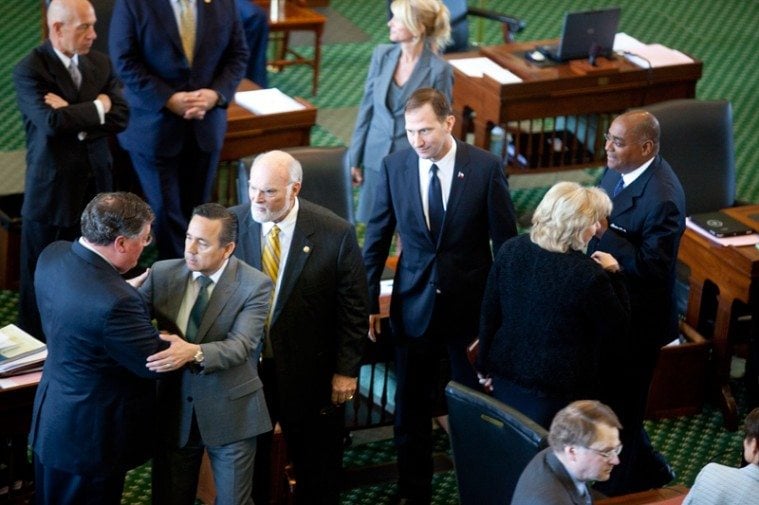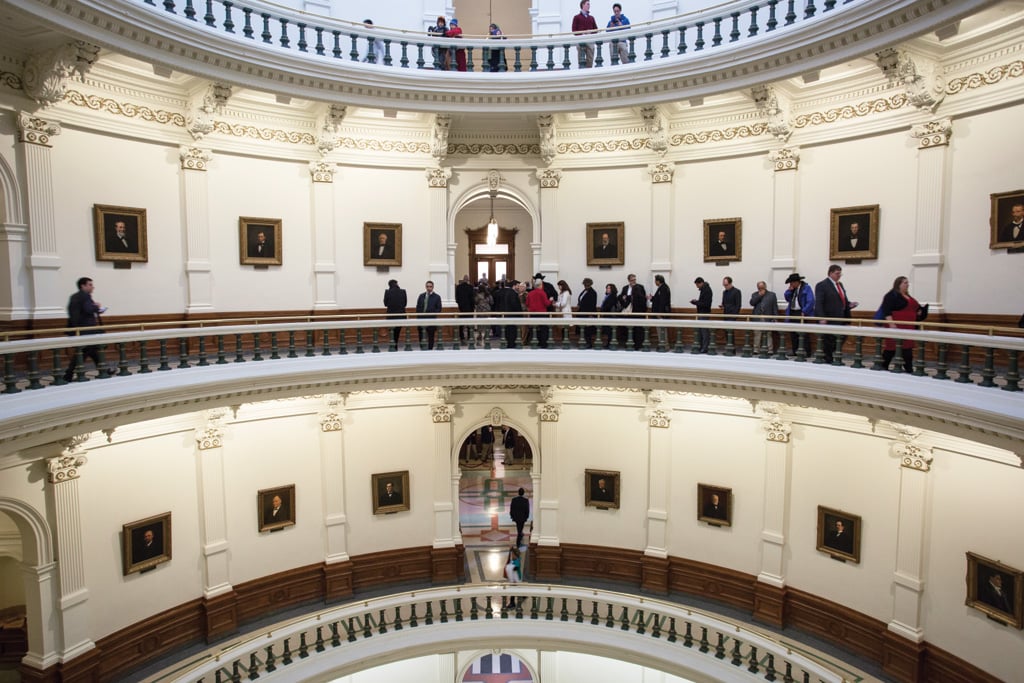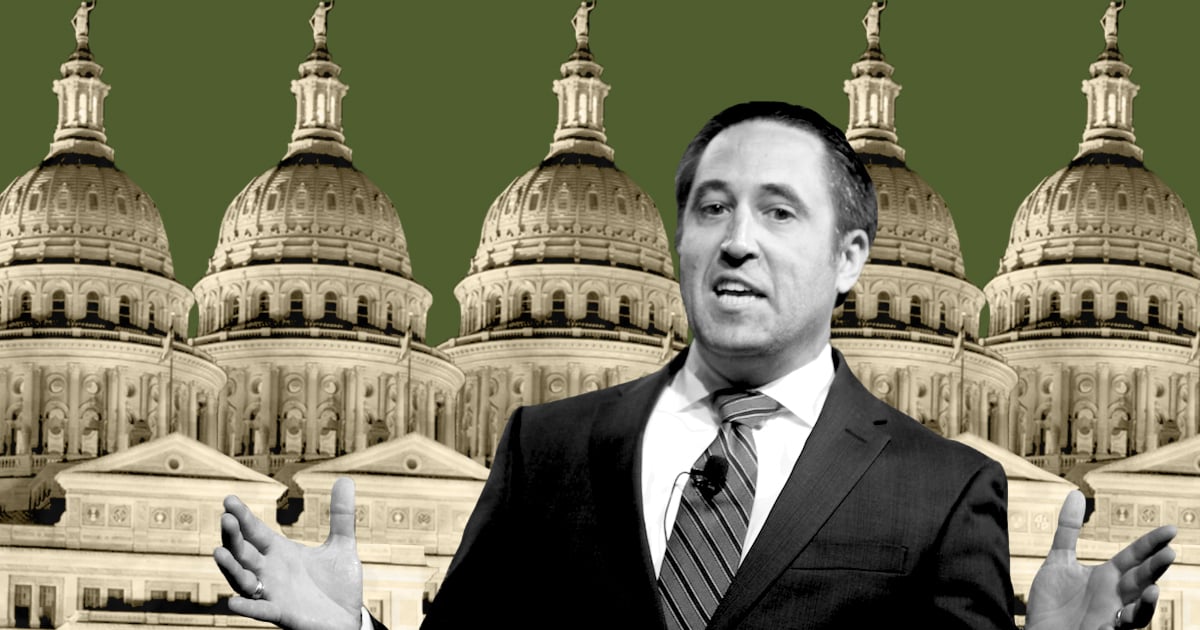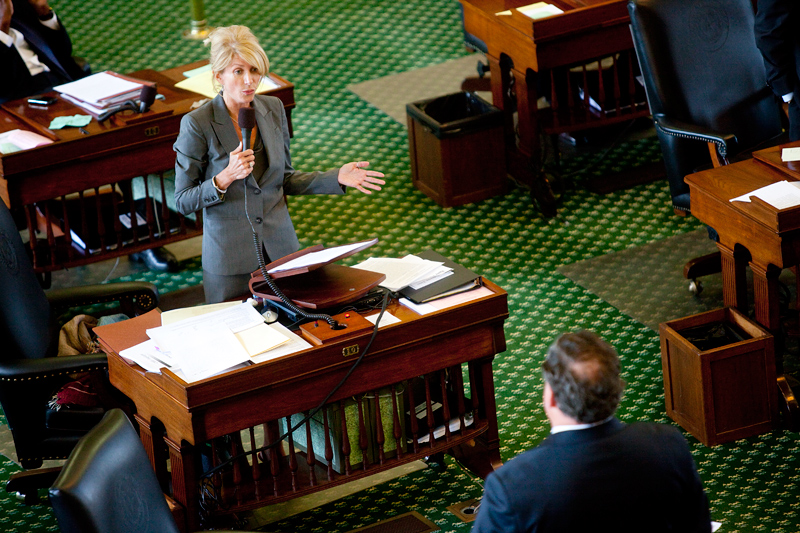
Senate Passes Budget Without School Funding Fight
Above: Sen. Wendy Davis (D-Fort Worth) grilled Senate Finance chair Tommy Williams (R-The Woodlands) on the budget proposal Wednesday, but stopped short of forcing a tough vote on new school funding.
The Senate passed its budget proposal Wednesday afternoon with broad support—only two senators voted against it. The only real debate was whether the budget devotes enough money to public schools, but the bill never faced a serious challenge.
After hours of polite questions and congratulations over the $195.5 billion budget proposal, Sen. Wendy Davis (D-Fort Worth) stood to announce her concerns. After last session’s draconian budget cuts to public education, she said, putting back $1.5 billion wasn’t enough.
Davis announced an amendment that would force the state to spend more on schools by putting any unexpected money the state raises toward public education.
It would have been the opportunity for Democrats to make a stand, and make Republicans look bad—the line-in-the-sand moment some Democratic groups were hoping to force today—but as soon as Davis introduced the amendment, she rescinded it.
“It’s not at all in my interest just to have people take a record vote that appears to be a pro-education vote or an anti-education vote,” Davis said. She wanted to talk about it instead, she said. The potentially nasty floor fight fizzled.
By ruling out using the state’s $12 billion Rainy Day Fund to fund schools or the state’s Medicaid IOU, she said, Senate leaders had ensured most of last session’s cuts would endure. “In my opinion, the budget process was artificially constrained from the start,” Davis said.
Davis congratulated the Senate Finance Committee on its work, but said the budget doesn’t even provide as much per-student funding as schools get today (after the dramatic cuts of 2011). Davis said Texas students deserve better.
Sen. Tommy Williams (R-The Woodlands), the first-time chair of Senate Finance, disagreed. He said 400 school districts would get more money than they do today, and that the bill does fund enrollment growth. “I appreciate your faint praise for our work on the budget,” Williams said, later adding that Davis was “vastly overstating the nature of the problem.”
Beyond that, senators generally agreed on the budget proposal, a stark contrast to last session’s budget battle when a revenue shortfall left lawmakers fighting for scraps. The most pressing issue, Williams said, was the state’s need for a new highway funding source to keep traffic congestion from getting any worse. By 2015, all bonding programs that fund transportation needs will be exhausted.
“We have a fiscal cliff here in Texas, it’s our highway funding,” Williams said. “I cannot emphasize how serious this is.”
There’s support in the Capitol today for tapping the state’s Rainy Day Fund to help fund transportation and the state water plan.
Sen. Rodney Ellis (D-Houston) asked Williams what he thought about doing the same to help fund public schools.
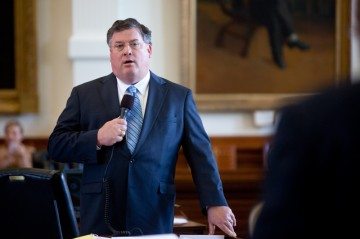
Williams wasn’t interested, he said, because the rainy day money spent on transportation and water would be one-time payments. Schools would need repeated spending from the fund every session.
“The ratings agencies are watching,” Williams said. If Texas spends too freely from its savings, he warned, “our state may face a credit downgrade.”
Ellis reminded Williams, though, that the state had completely drawn down the Rainy Day Fund to cover specific costs—including education—with in the last 10 years. Ellis said the budget’s $94 billion in general revenue is three-percent less than it would take to keep the state running at 2011 levels, quoting statistics from the Center for Public Policy Priorities. After adjusting for inflation, each public school student in Texas will receive $133 less in 2014 than in 2012, according to the group.
“I don’t believe that’s the case, but there’s room for us to disagree,” Williams said. “None of us are proud of what had to happen last session, but we made some tough decisions.”
Williams said he doesn’t believe there’s any money left on the table for public education. He said lawmakers will need the $410 million remaining in general revenue to pay for the costs of new laws passed this session.
Senators thanked each other for their work multiple times, and offered their gratitude to Williams for his openness leading the Senate Finance Committee.
Senators seemed relieved that this session’s budget process was such a marked difference from last session’s boiling debates and staunch partisanship. Each side came away looking like winners—Republicans can say they championed fiscal conservatism and Democrats can say they undid at least some of the cuts from last session. Only Davis and freshman Houston Democrat Sylvia Garcia—just a week into her time in the Senate—voted against the bill.
Sen. Judith Zaffirini (D-Laredo) praised Williams for his process crafting the budget. She felt pushed out of the process altogether last session, she said, which prompted her vote against the budget then. This time around, she said that because of Williams’ leadership, she was glad to support Senate Bill 1.
“Quite frankly, you impressed me,” Zaffirini told Williams.
Williams replied, “We’ve come a long way, baby, since last session.”
